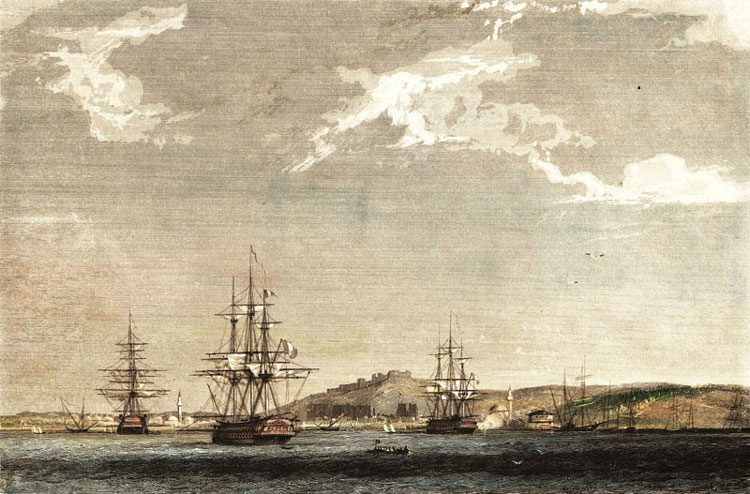
The Interviewees
Herve Georgelin | Pelin Böke | Alex Baltazzi | Axel Corlu | Philip Mansel | Antony Wynn | Fortunato Maresia | Vjeran Kursar | Christine Lindner | Frank Castiglione | Clifford Endres | Zeynep Cebeci Suvari | Sadık Uşaklıgil | İlhan Pınar | Ümit Eser | Bugra Poyraz | Oğuz Aydemir

Interview of Hervé Georgelin, the author of La fin de Smyrne: Du cosmopolitisme aux nationalismes [The end of Smyrna: From cosmopolitism to nationalisms], 2005
Can you please tell us, as a historian, how you got interested in the history of Minor Asia, and what were your incentives and motives for writing a book about Smyrna?
I would like to tell you some grand and erudite story about books and libraries, complex thoughts about urban destinies and precarious neighbouring in the Near East in order to answer your question with due intellectual glamour. The truth about the beginning of my interests is more prosaic. In my childhood, my father had a friend with a strange surname and a weird, almost imperceptible accent in French, like a deaf tone in some sounds. He was Paul Kalpokdjian whose ancestry had come from Smyrna to France via Crete. (I would learn about the port of embarkation much later.) He was my first lively link with the former crumbling Ottoman Empire. He rarely spoke about history but he repeatedly made jokes about hardworking Armenians, their dark ordeal before reaching the West, and Turks would be a subject of mockery, but rather in a benign way. In my late teen years, I happened to get in touch with other people from the South-Eastern Mediterranean. This time, Greeks happened to enter my life, in a very simple way: a classmate whose father was an expert at some international organization located in Paris. I was very fond of the whole Soumelis family and I decided to learn their language in a modest association. One of the children of this family liked to tease me, as the naive Westerner with Universalist views. I once had to endure such a statement: “the Turks took our best cities away: Constantinople and Smyrna.” I knew it was a joke made by someone largely indifferent to the subject, but to me, it was a bewildering statement. (I would remember that incident after the publication of my book in French.)
After a few years, I started studying Modern Greek at the Institut National des Langues et Civilisations Orientales in Paris. At this institution, my interest took a more formal tone, a more profound and aware quality. History and geography of the Balkan Peninsula was then taught by Bernard Lory whose major works and articles have been published or republished by Isis Press in Istanbul. His teaching was marvellously challenging for someone who had grown up in a centralist country with one official language, one state for centuries, one capital since ever, almost one unique state-controlled educational system and a single secular ethical background though largely shaped by Catholicism (and its criticism). I suppose he is the person to be thanked or blamed for any of my later writings. For there was no ‘chosen’ country on the Balkan peninsula, no language to be considered privileged, no single form of state construct to be preferred. Historiographical taboos were not the rule. The canon was rather to down track and elucidate them. That was no minor achievement. The Department of Greek was not located in the building of Balkan studies, but at quite a distance that compelled one to walk across the Seine to attend Lory’s sessions. Needless to say that neither was the Turkish Department located within the building for Balkan Studies, almost an allegory for the way these countries saw themselves outside the Balkan orbit. This made it hard for the Serbs and Croats and Albanians or learners of those languages to mix and form a functioning group of students. Lory was able to do that though. The divide between the victimized Christians of the Balkans and the former Muslim dominant group was put into perspective and if not radically denied, de-dramatized. Turkey was included in the history of the region and Turks were not considered as invaders from an alien planet but a legitimate part of the whole. When I reached the level of a PhD dissertation, I was looking for a proper topic. I happened to meet Hilmar Kayser at the Orientalist Bookshop, Samuélian, in Paris. We had a frank talk about my projects and he would orientate my curiosity towards Smyrna, about which at that time little had been written in Western languages. I considered it would be a fascinating case to survey. I applied to the École des Hautes Études en Sciences Sociales for Lucette Valensi’s tutorship, and I then embarked on my intellectual trip to late Ottoman Smyrna for several years.
How long did the research for ‘La fin de Smyrne’ take, and what sort of difficulties did you encounter during this process? Was language an obstacle, for instance, and how did you overcome it?
Including the preparatory years, I spent seven years of my life centred on researching late Ottoman Smyrna. I had to work simultaneously for some years as a German teacher at secondary schools and got a scholarship for some others which included teaching history at non-graduate levels at university. I went to archival depositories in France, Germany, Great Britain, Austria and Greece. I used university libraries wherever I could and was allowed to study in the reading room of the Greek Orthodox Patriarchate in Phanar/Fener in Istanbul. My approach wasn’t mainly political or geopolitical. Such texts are numerous, such interests are common. I wanted to conceptualise the functioning of a multiple society and its, at first slow, and then brisk destruction. I was interested in “minor” subjects: a bandit frightening Levantine planters, a report by a traveller on his experience in the prostitution district of the city, the replacement of non-Jewish by Jewish teachers at the schools of the Alliance Israélite Universelle whose archives are located in Paris, the various cultural celebration of the hierarchical world of the Belle Époque at least in official despatches, the ads for various schools in early September 1922 placed in forgotten newspapers, the debates in Arevelian Mamoul (Oriental Press), a fundamental Armenian-language, Izmir-based periodical whose complete collection is to be found in Paris at the Bibliothèque Noubar Pacha, the memories of the former general populace and its collapse as recorded by expelled Asia Minor Greek-Orthodox citizens in Greece when interviewed by agents of the Centre for Asia Minor Studies. I tried very hard to be up to the multilingualism of late Ottoman Smyrna with the one main obstacle for me being Turkish. As I mentioned above, language learning has much to do with human encounters. This just did not happen with me very early with Turkish-speaking people. I was always aware of that. It did not prevent me to learn enough Modern Turkish in order to use an encyclopaedia and journal articles or decipher books by Engin Berber, for instance.
I can say that learning Armenian was a sour task, mostly the first two years, because the language is isolated among the Indo-European group of language, but especially because the opportunities to use the language are so minimal. This is the reason why French Armenians usually have a poor command of their “national” language today. I had the chance to be immersed in a very hermit-like post-Ottoman Armenian world through my own marriage. Visiting searched-for in-laws from Aleppo proved an efficient way to allow for a degree of immersion. There is still today an Armenian-language newspaper based in Paris: Haratch, founded in 1925 in Paris by Schavarch Missakian (which was succeeded by Nor Haratch one year ago after Arpik Missakian’s retirement). Today the former human bonds are gone but the linguistic tools are happily still present.
In my opinion, as a historian and author you have a very distinct sense of writing style and approach to the subject matter. Can you tell us about your influences in and outside of history? Is there any particular book, author, theory or philosophy that you can name that had an effect on you?
It is not very easy to comment on your assessment. I can say that most historians I came in contact with value literature as a fundamental artistic and interpretative, cognitive activity. This is certainly the case of both Lucette Valensi and Bernard Lory. It is not to say that we don’t separate the activities but we recognise what may be common between the different writings. We don’t want to bore our readers. We are aware of the necessary plot-like narrative. The narrative has to be founded on external references, that we have to ponder, criticize, and set in perspective. We won’t propose any ultimate text. There is always the possibility of other sources, other documents appearing. None of us is apodictic. I could quote many other authors or books. I’ll concentrate on one book and one author: the book for its focus on many topics close to “my” Smyrna: Christian and Jews in the Ottoman Empire: The functioning of a multiple society by Braude and Lewis (ed.) and the author for his interest for hidden aspects of human experiences and inventive elaboration on sources: Alain Corbin whom I deem a major author with a broad historical and anthropological approach.
As I mentioned previously the Universalist French educational system formed my perception of the world. I can’t but think that human beings although much more diverse than once believed in the 1970s in this specific milieu are part of one and single category. If I have ever been unfaithful to that principle in my life or my concise works, I have always regretted that later or sooner. There is nothing utterly alien to an open mind. No Armenianness that is so special that an “odar” [foreigner], a non Armenian can’t understand it. And I could repeat this assumption with any kind of group: no undecipherable Greekness for a “xenos” nor an alien Turkishness for any “yabancı”... Understanding doesn’t imply any automatic support. This belief or rather this deep and practical conviction is something that was instilled in my brain very early, possibly with some naivety. I think that my formal education was deeply influenced by such phrases: “Chaque homme porte la forme entière de l’humaine condition” [Each man carries the whole form of the human condition - Michel de Montaigne] which is commented on as early as at high-school. It doesn’t imply any automaticity in understanding others but it asserts the possibility of approaching them because one is partly them and reciprocally, even if forms and even discourses contradict that anthropological axiom. I could also mention the pervading existentialism of the ethics conveyed by the educational French system in the 1980s in my milieu: there’s no human essence but moving, possibly evolving beings.
From what we understand of ‘La fin de Smyrne’, you seem to be in favour of cosmopolitanism and tend to see nationalism as a threat to its maintenance. I would like to ask how you conceive the term cosmopolitanism in today’s world in comparison with the past, and to what extent you think it is possible for people from different ethnic, religious or cultural backgrounds to live together in the urban space in peace.
I am not so sure I feel any nostalgia for Levantine cosmopolitanism. I certainly regret the bitter and violent end late Ottoman Smyrna had. I don’t perceive the purifying dimension of the destruction of buildings and massive murder and expulsion of people that took place in September 1922. I don’t see why Modern Turkey or any other state should look at that month with satisfaction. It certainly epitomizes the leaderships’ failure on all sides. What I find interesting and fascinating in that lively human kaleidoscope may have not existed in harmony. The various languages, religions, passports, geographical origins were not equally valued by former inhabitants of Smyrna. The diversity was maintained with some coherence through a shared social grammar that implied a strict hierarchy and separateness in many cases.
In respect to the above question, I wonder what you think about modern day Izmir. Do you think there is a chance to revive its glorious days, and if so, what advice would you give to its current residents as a foreign social scientist who had been there and studied its past?
I must confess that I hardly know contemporary Izmir. I was moved by the architectural remnants of the past: here a former Greek school, there the konak. I perceived the still valid divide across Izmir proper and Karsiyaka. It seemed that there never is a complete tabula rasa. I think that Izmir retained within the Turkish frame much of the ancient prestige of former late Ottoman Smyrna and possibly rightly so, even if redefined in the absence of most of its previous inhabitants or their descendents.
One can hardly deny that the symbolic importance of the place has been reduced outside Turkey. The imposition of Izmir as the only legitimate place name has cut the link between it and its possible symbolic heritage. Raisins from Smyrna, figs from Smyrna, carpets from Smyrna, Smyrna as a reference in the New Testament, all those elements have been separated from the port city. I supposed that Izmir is mainly known abroad as a touristic place with an important airport and with little continuity with history. I don’t know for sure though whether this is of any importance. A new kind of diversity is certainly more visible today than in the 1950s or the 1960s. Migrations from inner Anatolia, normal port traffic, the international Industrial fair contribute to alter a highly strict conform to the Republican Turkish pattern. Urbanity implies fluidity, alteration, and diversity. However, Izmir can never again be neither a major hub of French culture in the Eastern Mediterranean nor a major place of Greek-language cultural life. The juezmo has been successfully eradicated not only from Izmir but from this world, while Arevelian Mamoul, whose existence may be utterly unknown and indifferent to most Izmirlis, will never have any form of continuation.
What are your current and future projects?
I am currently translating an Armenian novel by Zaven Biberyan, to French. The book was written in the 1960s in Istanbul and that was recently also published in Turkish by Aras Yayıncılık with the title “Babam Aşkale’ye Gitmedi” [My father didn’t go to Aşkale = a penal colony in Eastern Turkey where non-Muslims who were unable to pay a minorities skewed exorbitant tax during WWII had to do manual labour]. The original title is more polysemic and self-critical, it is The Ants’ Sunset, that is the Sunset of the Armenians, seen as a mostly hardworking, non-reflecting, non self-critical, taboo-stricken group. I like literature because it is often the only path to express points of view that appear on the margin of a cultural entity, remain ostracized but can hardly be ignored forever. It is also a novel focusing on a diverse Istanbul/Bolis (in Armenian) in the 1940s and 1950s that is forever gone. It is the work of a convinced internationalist and a progressive mind. I feel much empathy towards Biberyan’s writing. The Armenian is elegant, rich, and full of different levels of speech, full of Turkish and Greek, full of daring ideas and non-conventional feelings and actions. While one could say I am doing something very different from writing a new historiographical book, I have no doubts on the the thematic unity of my activities.
The institutional future depends on many others’ intentions. Academia is a harsh world. It is no pure ideal world detached from earthy social rules. It is quite the contrary. But who knows? Renewed opportunities can appear all of a sudden. I quite enjoyed, for instance, being spontaneously contacted from Izmir for an interview! I am still actively searching for a permanent teaching and research position within an organizational frame that would benefit from my approaches and my knowledge.
I want to thank you for your interest. I hope that my book in Turkish may inspire local younger scholars and that it contributes to a comprehensive approach, a non-narrowly national conception of late Ottoman history. I am very grateful to Osman Köker and Birzamanlar Yayıncılık for the translation to Turkish and the publication of this historiographical survey, be it unusual in some of its aspects.
Interview conducted by Görkem Daşkan, November 2010.
To contact the author: hgeorgelin[at]noos.fr
Analysis of this book in the French review blog site: ‘Cahiers de la Mediterranee’
Hervé Georgelin published, amongst other works, in the ‘Balkanistic Forum’ periodical (2006) an article on: ‘Closeness and barriers between gender and ethnic groups in a late Ottoman urban setting’. In addition Hervé published in the Hispano-Helenica Association newsletter ‘Erytheia’ of 2011 an article on the subject: ‘Living together in urban contexts: Port Cities versus inner Anatolian Places’, in 2012 he was the co-author with Bernard Lory the published work: ‘Les Temps Entrelacés de deux villes pluricommunautaires: Smyrne et Monastir’ [The interleaved times of two multi-cultural communities: Smyrna and Monastir] and again in 2012 was the author of the article ‘Armenian inter-community relations in late Ottoman Smyrna’ published in the book series of ‘UCLA Armenian history and culture series - historic Armenian cities and provinces’, edition 11.

